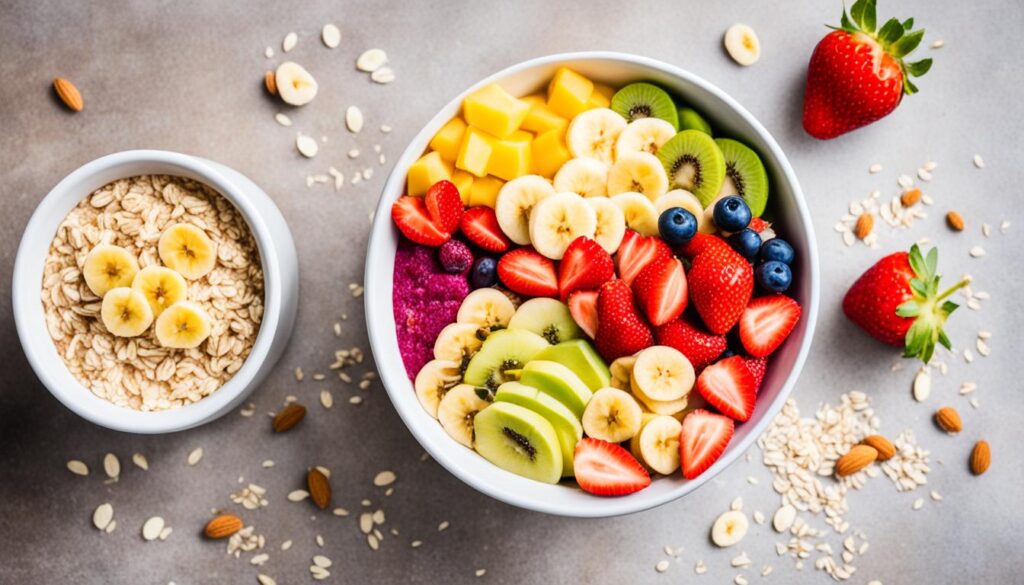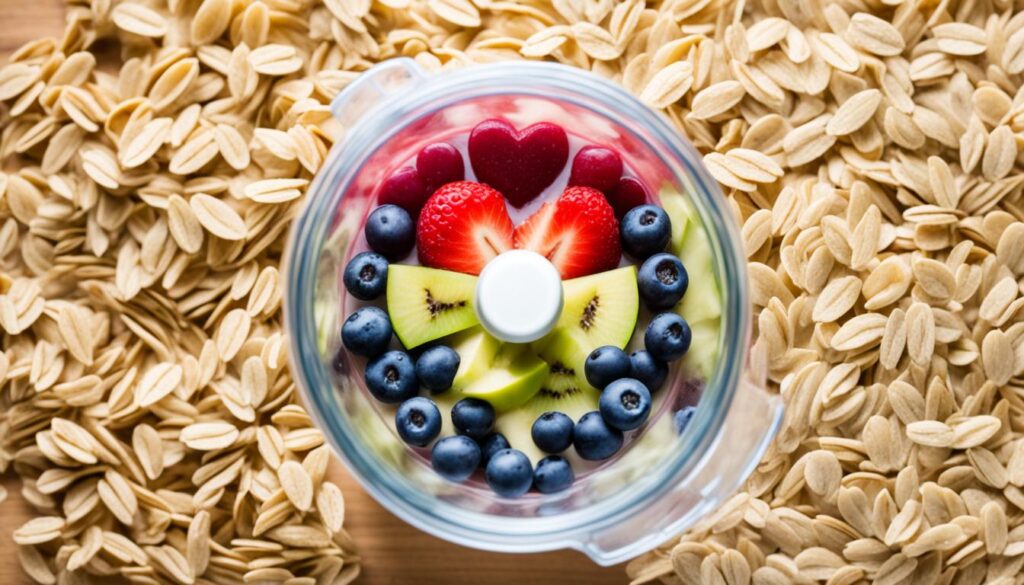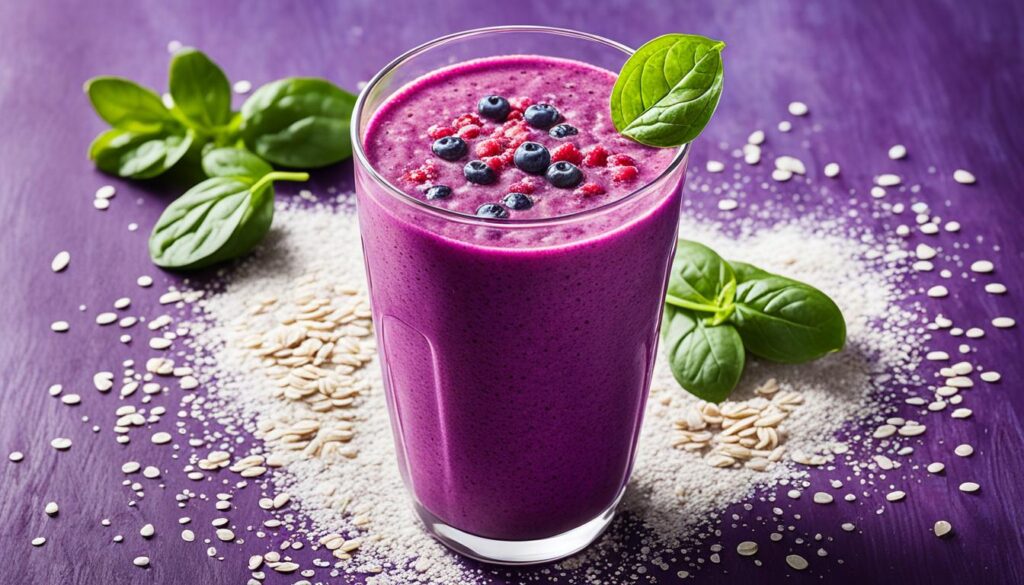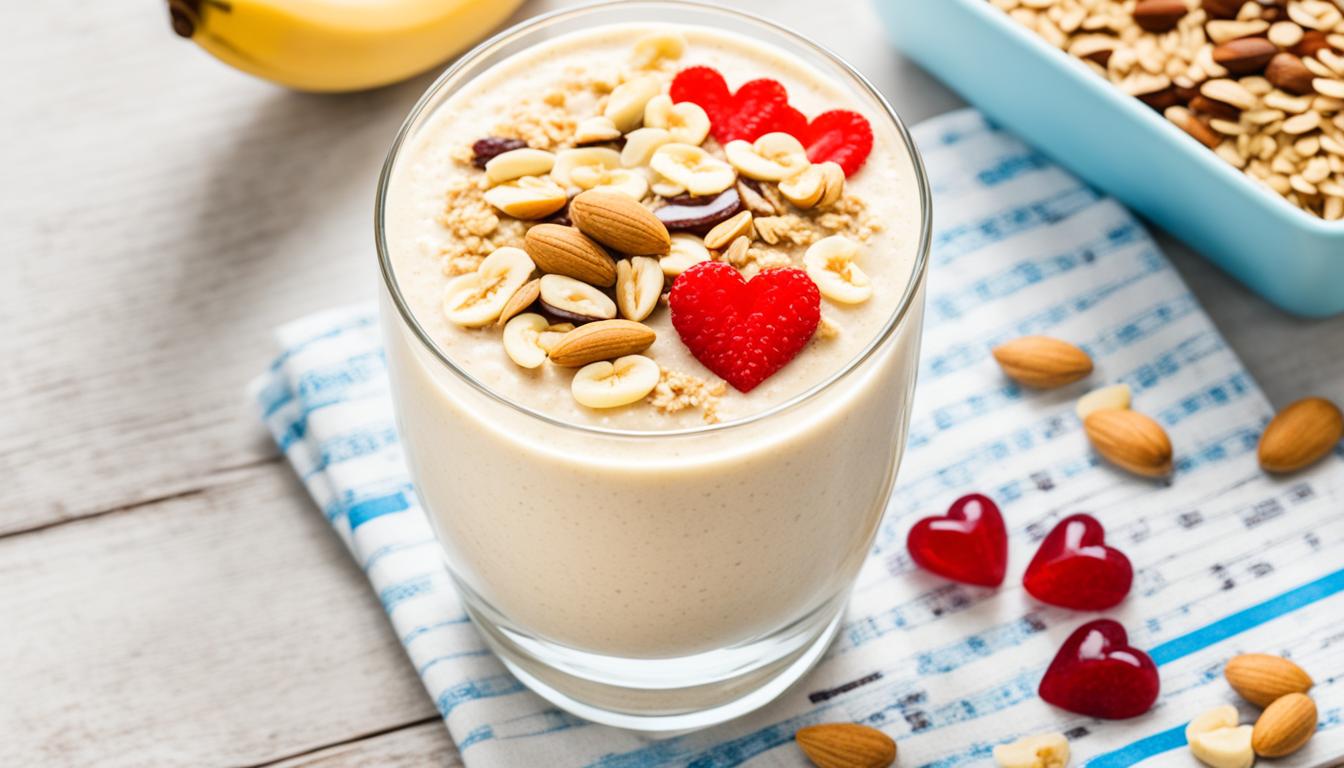Welcome to our article on the heart-healthy oatmeal smoothie that can help lower cholesterol levels. We understand the importance of maintaining healthy cholesterol for overall heart health, and we believe that incorporating this delicious smoothie into your diet can be a beneficial step towards achieving that goal.
In this article, we will dive into the key components of the oatmeal smoothie, discuss the various health benefits it offers for cholesterol management, and provide tips on how to customize it to suit your preferences. So, let’s explore the world of oatmeal smoothies and discover how they can support your heart health journey!
Key Takeaways:
- Oatmeal smoothies are an excellent way to lower cholesterol levels and promote heart health.
- Key ingredients, such as oats, blueberries, and Greek yogurt, play a vital role in managing cholesterol.
- Soluble fiber found in oatmeal helps reduce LDL cholesterol levels.
- Customize your oatmeal smoothie recipe to suit your taste preferences and dietary needs.
- Including oatmeal smoothies in your diet offers numerous additional health benefits.
Now that we have set the stage, let’s delve deeper into the nutrient powerhouse that is the oatmeal smoothie and explore how it can help you lower your cholesterol levels and improve your heart health.
The Nutrient Powerhouse: Oatmeal Smoothie to Lower Cholesterol
We all know that maintaining healthy cholesterol levels is important for overall heart health. One delicious way to support your heart is by incorporating a cholesterol-lowering oatmeal smoothie into your diet. This heart-healthy smoothie is packed with nutrients and has numerous benefits for your cholesterol levels.
Understanding Cholesterol and Oatmeal’s Role
Cholesterol is a fatty substance that is found in the blood. While our bodies need cholesterol to build healthy cells, too much LDL cholesterol, also known as “bad” cholesterol, can lead to a buildup in the arteries and increase the risk of heart disease. That’s where oatmeal comes in.
Oatmeal is a natural powerhouse when it comes to managing cholesterol levels. It contains a soluble fiber called beta-glucan, which has been linked to reducing LDL cholesterol levels. Regular consumption of oatmeal has shown promising results in lowering cholesterol and improving heart health.
Key Components: Oats, Blueberries, and Greek Yogurt
When it comes to creating a heart-healthy oatmeal smoothie, there are a few key ingredients that play a significant role in managing cholesterol levels.
- Oats: Oats are rich in soluble fiber, which helps to lower LDL cholesterol levels. They also provide sustained energy and promote feelings of fullness.
- Blueberries: Blueberries are packed with antioxidants, such as anthocyanins, which have been shown to support heart health. They also contribute additional fiber to the smoothie.
- Greek Yogurt: Greek yogurt is a great source of protein and contains probiotics, which promote a healthy gut microbiome. Studies suggest that probiotics may help reduce LDL cholesterol levels and support overall heart health.
The Role of Soluble Fiber in Managing Cholesterol
One of the key reasons why oatmeal is effective in lowering cholesterol is its high content of soluble fiber. Soluble fiber dissolves in water and forms a gel-like substance in the digestive tract. This gel binds to cholesterol, preventing its absorption into the bloodstream and facilitating its excretion from the body.
Incorporating soluble fiber-rich foods, like oatmeal, into your diet helps to reduce LDL cholesterol levels and improve heart health. By adding oatmeal to your smoothie, you can easily incorporate this important nutrient into your daily routine.
With a better understanding of cholesterol and the role of oatmeal in managing cholesterol levels, let’s explore the essential ingredients for a cholesterol-lowering smoothie in the next section.
Essential Ingredients for a Cholesterol-Lowering Smoothie
When it comes to creating a cholesterol-lowering oatmeal smoothie, certain ingredients pack a powerful punch in promoting heart health. Incorporating these essential components into your smoothie can help to lower cholesterol levels and support overall cardiovascular well-being.
Here are the key ingredients you should include in your heart-healthy smoothie:
- Oats: Start with a base of rolled oats or steel-cut oats. Oats are rich in soluble fiber, which plays a crucial role in managing cholesterol levels. Soluble fiber helps to reduce LDL (bad) cholesterol by interfering with its absorption in the intestines.
- Blueberries: Add a handful of antioxidant-rich blueberries to your smoothie. Blueberries are known for their anti-inflammatory properties and can help to combat oxidative stress, a contributing factor to heart disease. They also provide a sweet and tangy flavor to your smoothie.
- Greek Yogurt: Incorporate a scoop of Greek yogurt into your smoothie for added creaminess and a boost of protein. Greek yogurt contains probiotics, which promote a healthy gut and have been linked to improved heart health. Choose low-fat or non-fat options to keep the calorie and fat content in check.
- Other Heart-Healthy Additions: Consider including other ingredients that are known for their cholesterol-lowering properties. These may include chia seeds, flaxseeds, almonds, walnuts, or spinach. These additions provide additional nutrients, healthy fats, and fiber to further support your heart health.
To visually illustrate the essential ingredients for a cholesterol-lowering smoothie, take a look at the table below:
| Ingredient | Benefits |
|---|---|
| Oats | Rich in soluble fiber to help reduce LDL cholesterol levels |
| Blueberries | Antioxidant-rich, anti-inflammatory properties, and heart-healthy benefits |
| Greek Yogurt | Probiotics for gut health and additional protein |
| Other Heart-Healthy Additions | Additional nutrients, healthy fats, and fiber to support overall heart health |

Incorporating these essential ingredients into your cholesterol-lowering smoothie can enhance its heart-healthy benefits. Experiment with different combinations and quantities to find the perfect balance for your taste preferences and health goals. Cheers to a delicious and nourishing way to support your heart health!
Optimizing Your Oatmeal Smoothie Recipe
Creating the perfect oatmeal smoothie is all about optimizing the blend, texture, and sweetness. We want to ensure that every sip of your heart-healthy smoothie is packed with flavor and nutritional goodness. Here are some tips to help you achieve that smooth and creamy texture while customizing your recipe to fit your dietary needs.
Perfecting the Blend: Technique and Texture
Blending is a crucial step in achieving the desired texture for your oatmeal smoothie. To create a smooth and velvety consistency, start by blending the liquid and oats first until they form a creamy base. Gradually add your chosen fruits, vegetables, or other ingredients to the blender, ensuring that everything is thoroughly incorporated.
For an extra smooth texture, consider using a high-speed blender or adding a small amount of liquid at a time to avoid a too-thick or grainy consistency. If you prefer a thicker smoothie, try adding ice cubes or frozen fruits to the blend. Experiment with different blending times and speeds to find the perfect balance.

Plant-Based Alternatives for Dairy Ingredients
If you follow a plant-based or dairy-free diet, there are plenty of alternatives to Greek yogurt and other dairy ingredients that can still give your oatmeal smoothie a creamy texture and rich flavor. Consider using plant-based milk, such as almond milk, coconut milk, or oat milk, as a substitute for cow’s milk. These alternatives add a delightful creaminess to your smoothie while keeping it vegan-friendly.
For a protein boost, you can include plant-based protein powders derived from sources like peas, brown rice, or hemp. These powders blend smoothly and add a nutritional punch to your smoothie. Experiment with different plant-based alternatives to find the ones that suit your taste and dietary preferences.
Tailoring Sweetness: Honey and Other Natural Sweeteners
When it comes to sweetening your oatmeal smoothie, it’s best to opt for natural alternatives to reduce added sugars. Honey is a great choice as it not only adds sweetness but also offers potential health benefits. Honey can provide antioxidants and has been associated with heart-healthy properties. Add a drizzle of honey to your smoothie for a touch of natural sweetness.
You can also experiment with other natural sweeteners like maple syrup, agave nectar, or Medjool dates. These sweeteners impart flavor and sweetness without the need for refined sugars. Be mindful of the quantities you use to strike the right balance between taste and health.
By optimizing your oatmeal smoothie recipe, you can enjoy a delicious and heart-healthy beverage that meets your dietary needs. Blend with precision, explore plant-based alternatives, and choose natural sweeteners to create a smoothie that nourishes both your body and your taste buds.
Additional Health Benefits of Oatmeal Smoothies
In addition to their cholesterol-lowering properties, oatmeal smoothies offer a wide range of health benefits. By incorporating antioxidant-rich additions like berries and nuts, you can further enhance the nutritional value of your smoothie. Berries, such as blueberries and strawberries, are packed with vitamins, minerals, and antioxidants that contribute to heart health and overall well-being. These vibrant fruits are known for their ability to promote cardiovascular health, thanks to their high levels of flavonoids and anthocyanins.
Nuts, on the other hand, provide an excellent source of heart-healthy fats, protein, and fiber. They have been shown to help lower LDL cholesterol levels and reduce the risk of heart disease. Incorporating a variety of nuts, such as almonds, walnuts, and pistachios, into your oatmeal smoothie can add a satisfying crunch and a boost of nutrition.
Another key ingredient in oatmeal smoothies is Greek yogurt, which is well-known for its gut health benefits. Greek yogurt contains probiotics, which are beneficial bacteria that support a healthy digestive system. Probiotics play a crucial role in maintaining gut health and have been linked to a decreased risk of heart disease. Including Greek yogurt in your smoothie can help promote a balanced gut microbiome, improving digestion and overall well-being.
When selecting ingredients for your oatmeal smoothie, opt for nutrient-dense options to maximize the health benefits. Be sure to include a variety of vitamins and minerals that support heart health, such as potassium, magnesium, and vitamin C. Leafy greens, like spinach and kale, are excellent sources of these essential nutrients and can easily be incorporated into your smoothie.

The Best Times to Enjoy Your Heart-Healthy Smoothie
When it comes to reaping the maximum benefits of your cholesterol-lowering oatmeal smoothie, timing is everything. The optimal timing for consuming your smoothie depends on individual preferences and lifestyle factors. Here, we provide recommendations on when to enjoy your heart-healthy smoothie for best results.
1. As a Breakfast Option: Starting your day with a nutritious oatmeal smoothie can provide a nourishing and energy-boosting start. Consuming it in the morning can help kickstart your metabolism and provide sustained energy throughout the day.
2. As a Snack: If you prefer a lighter breakfast or have early morning commitments, enjoying your oatmeal smoothie as a mid-morning or mid-afternoon snack can be a great option. This can help curb hunger pangs, satisfy your cravings, and provide a nutrient-packed pick-me-up.
Regardless of the time you choose to consume your heart-healthy smoothie, it’s important to remember that consistency is key. Incorporating it into your daily routine can contribute to managing your cholesterol levels and promoting overall heart health.
“Whether you prefer it as a breakfast option or a snack, adding a heart-healthy oatmeal smoothie to your daily routine is a delicious and nutritious way to support your cholesterol-lowering goals.”

Customizing Your Smoothie for Dietary Restrictions
When it comes to oatmeal smoothies, customization is key to cater to various dietary restrictions and preferences. Whether you have gluten sensitivity, celiac disease, or follow a vegan or low-sugar diet, there are options available to ensure you can enjoy a delicious and nutritious smoothie while adhering to your dietary needs.
Gluten-Free Oat Options for Celiac or Sensitivity
For those with celiac disease or gluten sensitivity, it’s important to choose gluten-free oats to avoid any adverse reactions. Fortunately, several brands offer certified gluten-free oats that have undergone rigorous testing to ensure their safety. Some popular gluten-free oat options include Bob’s Red Mill Gluten-Free Rolled Oats and GF Harvest Gluten-Free Rolled Oats. These oats are processed in dedicated gluten-free facilities, making them suitable for individuals with celiac disease or gluten sensitivity.
Ensuring Adequate Protein in Vegan Variations
For vegan individuals, getting enough protein in their oatmeal smoothies is important to support a balanced diet. While oats provide some protein, it can be beneficial to include additional protein sources. Popular vegan protein options for smoothies include plant-based protein powders such as pea, hemp, or brown rice protein. These powders are easily digestible and can be added to your smoothie to enhance its protein content. Alternatively, you can incorporate ingredients like nut butter or silken tofu, both of which are great sources of plant-based protein.
Low-Sugar Fruits and Natural Sweeteners for Diabetics
For individuals with diabetes or those looking to reduce sugar intake, it’s important to choose low-sugar fruits and natural sweeteners for your oatmeal smoothie. Some low-sugar fruit options include berries (such as strawberries, raspberries, and blueberries), citrus fruits (like oranges and grapefruits), and melons (such as watermelon and cantaloupe). These fruits add natural sweetness without significantly impacting blood sugar levels. Additionally, natural sweeteners like stevia, monk fruit extract, or a small amount of raw honey can be used sparingly to sweeten the smoothie without causing a spike in blood sugar.
By customizing your oatmeal smoothie to fit your dietary restrictions, you can enjoy a delicious and nourishing beverage that aligns with your specific needs. Whether you need gluten-free oats, vegan protein sources, or low-sugar options, there are plenty of ways to create a customized smoothie that supports your health and well-being.
Conclusion
In conclusion, incorporating oatmeal smoothies into your diet can be a game-changer for lowering cholesterol and promoting heart health. By understanding the role of cholesterol and the key components of a heart-healthy oatmeal smoothie, such as oats, blueberries, and Greek yogurt, you can harness the power of these nutrient-dense ingredients to manage cholesterol levels effectively.
The soluble fiber found in oatmeal acts as a superstar in the battle against elevated LDL cholesterol. It helps to reduce the absorption of cholesterol into the bloodstream, thus supporting heart health. The addition of berries and nuts provides antioxidant benefits and further aids in reducing cholesterol levels. And let’s not forget about the gut health benefits of Greek yogurt; probiotics found in yogurt have been linked to improved heart health.
Customizing your oatmeal smoothie to fit your dietary restrictions is also achievable. From gluten-free oat options for those with celiac disease or sensitivity to ensuring adequate protein in vegan variations, there’s a smoothie recipe for everyone. For diabetics or those looking to reduce sugar intake, incorporating low-sugar fruits and natural sweeteners can help maintain blood sugar levels.
So why wait? Start your day or enjoy a satisfying snack with a heart-healthy oatmeal smoothie. With their versatility, accessibility, and numerous health benefits, oatmeal smoothies are a valuable addition to any cholesterol-lowering diet. Boost your well-being and take control of your heart health – one sip at a time.




